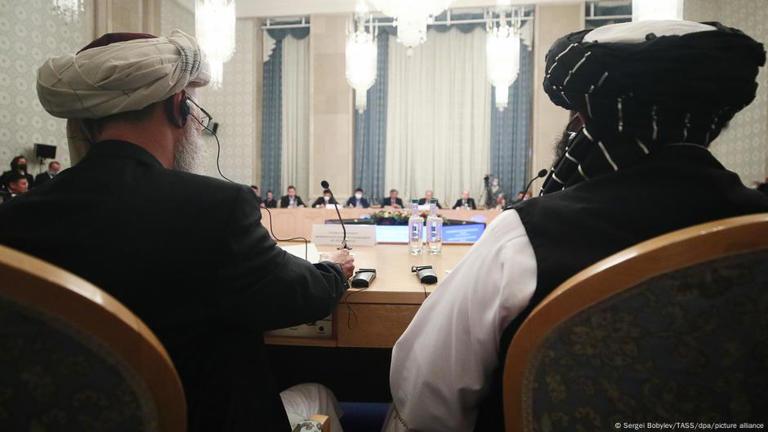
Russia: Why Kremlin no longer considers Taliban terrorists
In a closed session on April 17, the Supreme Court of the Russian Federation “temporarily” lifted Russia’s ban on the Taliban. The request came from the office of the prosecutor general.
This motion was based on a decree President Vladimir Putin had issued a year ago, making it possible for the Taliban, an ultraconservative political and religious movement in Afghanistan, to be removed from Russia’s list of terrorist organizations. The Taliban regained power in Kabul in 2021 after the withdrawal of international coalition forces from Afghanistan.
According to Russian law, any Taliban member entering Russia must be arrested and could face up to 20 years in prison on charges of engaging in terrorist activity. In practice, though, no Taliban member has been detained on entering Russia since 2016.
That was when the Kremlin opened unofficial negotiations with the Taliban. Since then, Taliban representatives have repeatedly visited Moscow and St. Petersburg and were even in attendance there on the sidelines of the 2024 International Economic Forum.
The Russian media continued to refer to the Taliban as a “terrorist organization, banned in Russia.” However, this changed in 2024, when Putin started to describe the Taliban as “allies in the fight against terrorism.”
The United States does not recognize Taliban as a terrorist organization, but has deemed it an insurgement movement.
Taliban supported Chechen fighters
During the second Chechen War, which lasted from 1999 to 2009, the Taliban supported Chechen fighters against Moscow, both financially and with weapons. They established diplomatic ties with the Chechen government of Aslan Maskhadov and recognized the autonomous republic’s declaration of independence from Russia.
Following the terror attacks by al-Qaeda in the United States on September 11, 2001, the Taliban, which had ruled most of Afghanistan since 1996, were ousted by a US-led coalition. NATO allies then deployed the ISAF mission to support the new Afghan government under a UN Security Council mandate.
The Taliban hoped to gain support from Moscow. In a subsequent BBC interview, the then-chief of staff of Russia’s presidential administration, Sergei Ivanov, revealed that Afghanistan’s spiritual leader, Mullah Omar, had proposed in 2001 that Russia and the Taliban should join forces “to fight American aggression.”
According to Ivanov, the Kremlin’s response, in English, was: “F— off.” In 2003, Russia officially designated the Taliban a terrorist organization.
However, in 2015, the Kremlin started to establish “channels of communication” with the Taliban. Last year, Putin signed the decree enabling their removal from the terrorism list. This process may also allow Moscow to de-list Hayat Tahrir al-Sham (HTS), the group that currently controls the transitional government in Syria.
What changes, in legal terms?
The Supreme Court’s decision apparently allows Russia to finalize comprehensive agreements with Afghanistan directly. Evgeniy Smirnov of the independent human rights group Pervyi Otdel (“First Department”) told DW that Russian criminal law stipulates prison sentences of varying lengths for collaborating with organizations designated as terrorists.
Despite this, contracts were signed in 2024 for the supply of oil products, wheat and flour. Smirnov commented that these deals may have been made through business structures with no Taliban representatives directly involved.
Smirnov also noted that Russian law does not clearly define a procedure for reversing a terrorism designation. “The temporary removal means the organization is effectively off the list. From that point on, collaboration with the Taliban no longer has criminal consequences. However, existing convictions cannot be overturned,” he explained.
Political immunity in Russia
The Middle East expert Ruslan Suleymanov said that, to date, no country has officially recognized the Taliban as the legitimate government of Afghanistan. But, he added, the Taliban are trying to end their international isolation. They have already convinced Kazakhstan and Kyrgyzstan to remove the group from their respective national lists of terrorist organizations.
However, he cautioned, “they have only gained indirect recognition so far. China, for example, has agreed to accept the Taliban-appointed ambassador, whereas Russia has only accepted a temporary chargé d’affaires.”
In his view, international skepticism toward the Taliban stems from the return of strict, repressive laws in Afghanistan, similar to those that were in force under their previous period of rule, between 1996 and 2001. The human rights situation in the country has deteriorated dramatically, especially for women and girls.
Suleymanov added that Moscow started to establish ties with more moderate Taliban representatives against the backdrop of its worsening relations with the West, as Russia considers itself a key player in the region. This is connected to the political immunity Taliban representatives have enjoyed when traveling to Russia.
According to Suleymanov, when the US withdrew from Afghanistan in 2021, the Kremlin was keen to demonstrate that US foreign policy had failed.
“Russian propaganda applauded the Taliban, and, generally speaking, that continues to this day, amid the ongoing anti-Western rhetoric in Russia.”





